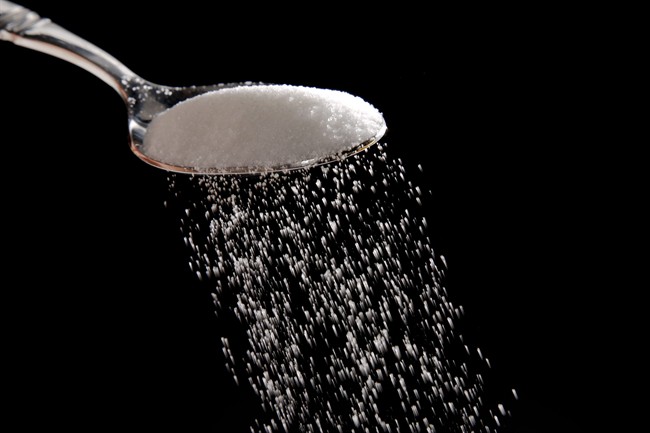The sugar lurking in many of Canadians’ favourite beverages is putting us at risk for potentially deadly health complications while also taking a major toll on our health-care system.

A new report estimates that sugary drink consumption will result in 63,000 deaths over the next 25 years while costing the system more than $50 billion.
READ MORE: How much sugar and how many calories are in your drink?
According to the report released by the Canadian Cancer Society (CCS) with research from the University of Waterloo, Canadians’ sugar consumption will lead to:
- More than 1 million cases of overweight people and more than 3 million cases of obesity.
- Almost 1 million cases of Type 2 diabetes.
- Almost 300,000 cases of ischemic heart disease.
- More than 100,000 cases of cancer.
- Almost 40,000 strokes.
The Canadian Diabetes Association recommends keeping sugar intake to less than 10 per cent of all calories. That’s about 50 grams of sugar (12 teaspoons) for a person consuming 2,000 calories.
READ MORE: Are sugar limit guidelines based on robust science? This Canadian study says no
While soda sales are down, other sugary drinks are gaining in popularity, the report states. Between 2004 and 2015, sales of energy drinks soared by 638 per cent, sweetened coffees by 579 per cent, and flavoured water by 527 per cent.
One 250-millilitre can of a popular energy drink contains 26 grams of sugar; a wildly popular seasonal coffee beverage contains 50 grams of sugar in a 473-millilitre serving.
On average, Canadians purchase an average of 444 millilitres of sugary drinks every day, the report states.
The Canadian Beverage Association argues it’s simplistic to pinpoint one part of a diet when working to tackle issues such as obesity.
“While the beverage industry supports efforts to address serious diseases like obesity and diabetes, it is illogical to isolate one single ingredient or product as a unique contributor,” the statement read.
A recent Canadian study found added sugar in more than two-thirds of pre-made food in the grocery store.
While beverages are only one part of a bigger picture, it’s easy to overlook sugar and its accompanying calories in beverages, said Dr. Robert Nuttall, CCS assistant director of health policy.
While sugar doesn’t cause cancer, too much of it can lead to weight gain, which is linked to a number of health issues, Nuttall said.
“We know that a significant risk factor for cancer is body weight. Having a high body weight — being overweight or obese — can put you at risk of at least 11 different types of cancers.”
Those include breast, kidney and liver cancer, Nuttall said. Health experts say that maintaining a healthy body weight is crucial; getting people motivated is the hard part.
READ MORE: How much sugar should you be eating? How to follow the WHO’s guidelines
“It’s really trying to figure out, what are the best ways to address body weight?” he said.
In the simplest terms, Canadians need to balance the energy they consume through food and drinks versus how much energy they expend in order to maintain a healthy body weight. When you don’t expend enough energy, your body builds up fat tissue.
With a little awareness, Nuttall said, consumers can reach for better choices and be on the path to a healthier future.
“Think about your health when you’re having those sugary drinks.”









Comments